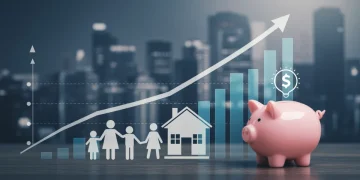The impact of inflation on everyday expenses

The impact of inflation on everyday expenses leads to increased costs for groceries, housing, and transportation, requiring effective budgeting and smart shopping strategies to manage rising prices.
The impact of inflation on everyday expenses can be more significant than we realize. Have you noticed your favorite products getting pricier? It’s essential to understand how inflation shapes our spending.
Understanding inflation and its causes
Understanding inflation is essential for managing your finances effectively. Inflation is the rate at which the general level of prices for goods and services rises, leading to a decrease in purchasing power. As inflation increases, you might find that your money buys less than it used to. But what causes this rise in prices?
Factors that Contribute to Inflation
Several elements can trigger inflation, including:
- Demand-pull inflation: This occurs when demand for products exceeds supply, causing prices to rise.
- Cost-push inflation: When production costs increase, businesses may pass those costs onto consumers, leading to higher prices.
- Monetary policy: Changes in interest rates and money supply can influence inflation rates significantly.
- Supply chain disruptions: Events like natural disasters or pandemics can impact supply, leading to price increases.
By understanding these factors, you can better anticipate changes in prices. The economic cycle plays a crucial role in inflation as well. During periods of economic growth, demand can soar, resulting in higher prices. Conversely, during a recession, inflation may slow down as demand decreases.
The role of expectations
Expectations of future inflation can also impact current inflation rates. When consumers expect prices to rise, they may spend more now, driving demand and pushing prices higher. Conversely, if people expect inflation to drop, they may hold off on spending, leading to reduced demand.
In summary, understanding the causes of inflation helps you make informed financial decisions. Keeping up with economic trends and being aware of the factors contributing to inflation can prepare you for potential changes in your everyday expenses.
How inflation affects your grocery bills
How inflation affects your grocery bills is an important topic for anyone trying to manage household expenses. When inflation rises, the cost of groceries can also surge, impacting your overall budget significantly. Many families notice that their regular shopping trips start costing more.
The Rising Prices of Common Items
Several factors contribute to changes in grocery prices:
- Increased production costs: When farmers face higher costs for seeds, equipment, and labor, these expenses often translate to higher prices in stores.
- Transportation costs: If fuel prices increase, so do the logistics expenses of getting goods from farms to grocery stores.
- Supply chain issues: Disruptions in supply chains can limit product availability and lead to higher prices.
As groceries become more expensive, families may reconsider their shopping habits. One way to manage inflation’s impact is by planning meals and shopping lists carefully. By doing so, you can avoid impulse purchases that may strain your wallet.
Adapting Your Shopping Habits
Adapting to inflation requires some creativity. Many people are turning to bulk purchases or discount stores to save money on essential items. Others are considering alternatives, such as switching to generic brands to keep costs in check. These changes might seem small, but they can add up over time, allowing you to minimize the squeeze on your grocery budget.
Additionally, cooking at home rather than dining out is another effective way to respond to rising food costs. Home-cooked meals are often more economical and healthier.
By making smart choices while shopping, you can mitigate the effects of inflation on your grocery bills. Staying informed about prices and planning wisely can make a significant difference in your finances.
The rise of transportation costs due to inflation

The rise of transportation costs due to inflation is a significant issue impacting many sectors. When inflation occurs, the prices related to moving goods from one place to another can increase, affecting everything from food prices to consumer goods.
Factors Influencing Transportation Costs
Transportation costs rise for several reasons:
- Fuel prices: One of the main drivers is the increase in fuel prices. When crude oil prices rise, the cost of gasoline and diesel also goes up, leading to higher transportation fees.
- Vehicle maintenance: Inflation can also affect the cost of vehicle maintenance and repairs. As parts and services become more expensive, transportation companies may need to raise their rates.
- Labor costs: If wages for drivers and workers increase due to inflation, logistics companies often pass these costs onto consumers.
- Supply chain disruptions: Inflation might lead to delays in supply chains, causing companies to spend more on expedited shipping methods.
As transportation costs continue to climb, consumers can feel the pinch. The prices of everyday items, from groceries to clothing, can increase as businesses adjust their pricing to cover the added transportation expenses. It becomes essential for consumers to stay informed about these changes.
How to Manage Rising Transportation Costs
To cope with rising transportation costs, many people are turning to alternative transportation options. Carpooling, using public transportation, or even biking can reduce personal expenses significantly. Additionally, shopping locally helps lessen the impact of transportation, as it reduces the distance goods must travel.
Being aware of these factors allows consumers to strategize their spending better. Additionally, understanding how transportation costs correlate with overall inflation helps in planning budgets more effectively.
Inflation’s impact on housing expenses
Inflation’s impact on housing expenses is a crucial aspect for many individuals and families. When inflation rises, it often leads to increased costs in housing, affecting rent, mortgages, and property prices.
The Rising Costs of Rent and Mortgages
As inflation accelerates, many landlords may raise rents. This is partly due to increased demand for housing and higher costs associated with property maintenance. Higher inflation can also influence mortgage rates, making borrowing more expensive.
- Increased property prices: As inflation rises, the value of homes usually follows, making it harder for first-time buyers to enter the market.
- Higher interest rates: When inflation is high, banks often increase interest rates to manage economic stability. This means higher monthly payments for mortgages.
- Rental market changes: Many tenants find themselves facing higher rents as landlords adjust to keep up with inflation.
Moreover, homeowners may feel the squeeze in other ways. Increased property taxes and utility costs can make maintaining a home more expensive than expected. Repair costs can also surge due to inflation, further stretching budgets.
Strategies to Cope with Rising Housing Costs
To combat the rising costs in housing, many individuals are exploring various strategies. Some are choosing to live in suburbs or rural areas where housing tends to be more affordable. Others are looking for ways to negotiate rent or research housing assistance programs that may be available.
Sharing expenses with roommates or family members can also relieve some financial pressure. These adjustments can make housing more manageable, even when faced with the challenges of inflation.
Being informed about the market is essential. Understanding the factors that contribute to rising housing costs helps in making better financial decisions.
Strategies to cope with inflation and keep spending in check
Strategies to cope with inflation and keep spending in check are essential for financial stability. As prices rise, it becomes increasingly important to manage your budget effectively. One can adapt spending habits to face these economic changes.
Evaluate Your Budget
The first step is to thoroughly evaluate your budget. Identify essential expenses like housing, groceries, and transportation. Then, analyze discretionary items you can reduce or eliminate. This involves setting clear priorities for your spending.
- Cut unnecessary subscriptions: Review your monthly services and subscriptions. Cancel those you rarely use.
- Plan meals: Instead of impulsive grocery shopping, create a meal plan to reduce waste and save money.
- Use coupons and discounts: Stay on the lookout for sales, specials, and coupons to lower grocery and household costs.
When adjusting your budget, it’s also helpful to track your spending. Keep a record of expenses to identify patterns and pinpoint areas where you can save.
Embrace Smart Shopping Habits
Another effective strategy is to adopt smart shopping habits. Buying in bulk can save money over time, especially for non-perishable items. Additionally, consider opting for generic brands, which often provide the same quality as name-brand products at a lower price.
Using cash instead of credit cards can help control spending. Withdraw a set amount for the week and stick to it. This approach creates a tangible limit that can prevent overspending.
Lastly, don’t forget to review your energy and utility costs. Simple adjustments, like using energy-efficient appliances or being mindful of water usage, can lead to substantial savings over time.
FAQ – Frequently Asked Questions about Coping with Inflation
What are effective ways to evaluate my budget during inflation?
Start by listing all your essential expenses, then identify areas where you can cut back or eliminate unnecessary costs.
How can I save money while grocery shopping?
Consider buying in bulk, using coupons, and choosing generic brands to lower your overall grocery expenses.
Why is tracking my spending important?
Tracking your spending helps you understand where your money goes and allows you to identify spending habits that can be adjusted to save more.
What strategies can I use to manage my energy costs?
Implement energy-saving measures like using energy-efficient appliances and being mindful of your electric usage to lower your monthly bills.





